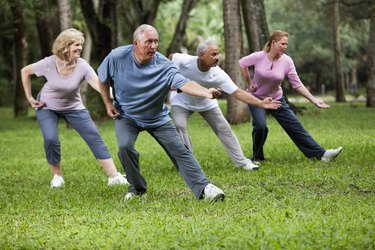
More than a year into the novel coronavirus pandemic, researchers are still working tirelessly to better understand the virus behind COVID-19 and its short- and long-term health implications.
The most commonly reported symptoms include fatigue, shortness of breath, coughing and joint and chest pain, per the Centers for Disease Control and Prevention (CDC), but long-term effects may include difficulty thinking and concentrating, aka "brain fog."
Video of the Day
Video of the Day
These brain symptoms have been identified in many "long-hauler" patients who continue to suffer lingering symptoms six months or more after being initially diagnosed with COVID-19, as shown in one September 2020 medical review in JAMA.
Here, we'll take a look at what we know so far about COVID's affect on the brain and what you can do to support your brain health after infection.
How COVID Can Affect the Brain
Not everyone who has COVID ends up with brain symptoms, but there are a few to look out for:
1. COVID Encephalitis
Among the more severe effects is something coming to be known as COVID encephalitis, or inflammation of the brain.
Early data from an October 2020 study in the Journal of the Neurological Sciences suggests that up to 13 percent of people who have COVID-19 and who have neurological complications may go on to experience some form of encephalitis.
Although not very common, "We know from experience that encephalitis caused by other viruses can lead to long-term issues, such as early dementia or stroke, so the concern is that a COVID-19-induced encephalitis might have the same consequences," Stephen Hurlbut, MD, a neurologist with Texas Health Harris Methodist Hospital, tells LIVESTRONG.com.
2. Mental Health Issues
Psychiatric symptoms have also been reported in people suffering from "long COVID." A February 2021 study in JAMA Psychiatry found that an estimated 24 percent of patients recovering from severe COVID-19 infections met the criteria for depression and/or generalized anxiety disorder. (The number is closer to 11 percent in the general adult population, per the CDC.)
The same study also found an association between patients recovering from severe COVID-19 and post-traumatic stress disorder (PTSD).
"PTSD not only includes depression and anxiety, but also produces problems with sleeping that further reduce cognitive function," explains neuropsychologist Paul Schulz, MD, professor of neurology and director of the Memory Disorders and Dementia Clinic at McGovern Medical School.
3. Chronic Fatigue Syndrome
A number of post-viral syndromes involving the brain have also been seen with COVID-19, such as chronic fatigue syndrome/myalgic encephalomyelitis (CFS/ME), a disorder marked by extreme fatigue or tiredness that can also cause memory issues and difficulty concentrating.
"It has been very difficult to figure out why some people get CFS/ME, but we do see lots of people with [the disorder] after any viral illness, and the same seems to apply to COVID," Dr. Schulz says.
9 Ways to Support Brain Health Post-COVID
Beyond working with your doctor, here are some of the ways you can work to rebuild your neurological health as your body recovers from COVID.
1. Engage in Mentally Stimulating Activities
In the same way that exercising the muscles in your body improves its strength, exercising the brain through mental stimulation, or mental exercises, improves its health, notes Eva Feldman, MD, PhD, professor of neurology at Michigan Medicine.
Research, including one December 2016 study in Brain Imaging and Behavior, has shown that mentally challenging your brain creates new connections that protect against future memory loss.
When it comes to selecting these activities, start with things you enjoy, such as crosswords or Sudoku puzzles.
"Try to find things that make you use your brain in a way that you find enjoyable and a little challenging," Dr. Hurlbut says.
2. Eat Brain-Friendly Foods
A healthy diet benefits every organ in your body, including your brain.
"Consuming a diet consisting of green leafy vegetables, fish, legumes and whole grains will improve the health of blood vessels of the brain and help prevent cerebrovascular disorders like stroke," says Vinit Mehrotra, MD, a neurologist with Texas Health Harris Methodist Hospital Fort Worth.
Dr. Mehrotra further breaks down the best brain foods like this:
1. Green leafy vegetables are rich in brain-healthy nutrients like vitamin K, folate and beta carotene. Healthy picks include:
- Spinach
- Kale
- Collard greens
- Lettuces
- Microgreens
2. Fatty fish are a source of omega-3 fatty acids, which have been linked to lower blood levels of beta amyloid, a protein found in Alzheimer's and dementia. Good picks include:
- Salmon
- Tuna
- Mackerel
- Trout
- Shellfish
3. Berries are also brain-boosting, as they contain flavonoids and anthocyanins, which are linked to brain health, per an August 2017 review in Food and Nutrition Research. Think:
- Blackberries
- Blueberries
- Raspberries
- Strawberries
3. Fit in Some Form of Fitness Daily
Exercise benefits almost every facet of your health, from reducing your risk of heart disease to strengthening your muscles and bones. It also boosts your brain health.
"Daily exercise will keep the blood vessels open and improve brain oxygenation, as bloodflow through the blood vessels is how the brain is oxygenated," says Dr. Mehrotra. "This will prevent slow damage and the death of brain cells, which in turn will improve the overall function of the brain."
While any type of exercise can yield brain-boosting benefits, research, including one April 2013 study in PLOS One, has shown tai chi to be especially effective.
4. Quit Unhealthy Lifestyle Behaviors
Smoking, drinking and doing recreational drugs are all harmful to your physical health, but they can be bad news for your neurological health, too.
"Smoking is known to increase the incidence of cerebrovascular disorders, such as stroke, and recreational drugs, such as cocaine and amphetamines, can cause damage to blood vessels of the brain as well as the brain cells themselves, which can lead to an increased incidence of stroke and dementia," says Dr. Mehrotra. "Alcohol use, too, is harmful, as it can cause seizures and damage to the nerves in distal parts of the limbs (peripheral neuropathy) when consumed in excessive amounts."
Related Reading
"With many of us experiencing new levels of isolation during the pandemic, it's critical that we find ways to connect and assure that we are not feeling alone and cut off, even if physically distanced," says Scott Kaiser, MD, geriatrician and director of Geriatric Cognitive Health for the Pacific Neuroscience Institute at Providence Saint John's Health Center in Santa Monica, California.
For those looking to increase their social connectivity, he recommends starting small, such as reaching out to someone who may be particularly vulnerable and isolated and who might not have any quick and easy way to connect.
"Social call programs, such as Call Hub, designed to engage isolated older adults with volunteers have been proven to reduce feelings of isolation, anxiety and depression," he says.
6. Practice Meditation
Meditation has been around since ancient times, but researchers are only starting to grasp the mind-body benefits associated with it.
"Just taking some mindful breaths can help you curb stress while initiating a physiologic relaxation response in your body that results in a slowing of the heart rate, change in blood vessel tone with reduced blood pressure, boosting of immune factors, lowering of blood sugar and improved mood," says Dr. Kaiser.
7. Give Back
On the topic of purpose, volunteering is one way people can feel a sense of purpose and meaning in their lives — and doing so may boost your cognitive functioning.
One 2017 study in The Journals of Gerontology found an association between volunteering and enhanced cognitive functioning in older adults.
"The research on volunteerism clearly demonstrates its rich benefits and its powerful role as a valuable ingredient for healthy aging," Dr. Kaiser says.
8. Get a Good Night’s Sleep
The brain benefits of sleep are immeasurable. "Whether through the clearing of debris, 'resetting' of neural networks or providing down-time to various systems, the quantity and quality of sleep have profound physiological impacts that impact our day-to-day thinking, memory and mood as well as our long-term risk of cognitive decline and dementia," Dr. Kaiser says.
The National Sleep Foundation recommends an average of seven to nine hours of sleep per night for adults for optimal health.
Related Reading
9. Pursue Your Life's Purpose
It makes sense that having a reason to get up in the morning and a sense of importance affects that way you feel — and research supports this.
In fact, one July 2012 study in Archives of General Psychiatry found that people who scored high on an assessment of purpose in life were more than twice as likely to remain free of Alzheimer's disease than those with low scores.
"Knowing that people are depending upon you and feeling that you are making important contributions and possibly even making a difference in this world could certainly contribute to healthy aging," Dr. Kaiser says.
Always wanted to write a book? Tempted to go back to school or switch careers? There's no time like the present.
- JAMA: "As Their Numbers Grow, COVID-19 'Long Haulers' Stump Experts"
- Journal of the Neurological Sciences: "Neurological complications of coronavirus infection; a comparative review and lessons learned during the COVID-19 pandemic"
- JAMA Psychiatry: "Posttraumatic Stress Disorder in Patients After Severe COVID-19 Infection"
- Brain Imaging and Behavior: "Participation in cognitively-stimulating activities is associated with brain structure and cognitive function in preclinical Alzheimer’s disease"
- PLOS One: "Can Taichi Reshape the Brain? A Brain Morphometry Study"
- Archives of General Psychiatry: "Effect of Purpose in Life on the Relation Between Alzheimer Disease Pathologic Changes on Cognitive Function in Advanced Age"
- The Journals of Gerontology: "Longitudinal Associations Between Formal Volunteering and Cognitive Functioning"
- National Sleep Foundation: "How Much Sleep Do We Really Need?"
- CDC: "FastStats: Mental Health"
- CDC: "Long COVID or Post-COVID Conditions"
- Food and Nutrition Research: "Anthocyanidins and anthocyanins: colored pigments as food, pharmaceutical ingredients, and the potential health benefits"
Is this an emergency? If you are experiencing serious medical symptoms, please see the National Library of Medicine’s list of signs you need emergency medical attention or call 911.





